Neuralink, a business run by Elon Musk that makes brain implants, says that U.S. regulators have given them permission to test their device on people.
The company made the news on Twitter Thursday evening, but there are no details about a possible study, which is not listed in the U.S. government’s database of clinical trials.
Food and Drug Administration officials wouldn’t confirm or deny that the approval was given, but a spokesperson said in an email that the FDA “acknowledges and understands” that Musk’s company made the statement.
Neuralink is one of many groups that are trying to connect the nervous system to computers. These efforts are meant to help treat brain diseases, recover from brain injuries, and do other things.
This week, for example, Swiss researchers released a study in the journal Nature about an implant that helps the brain and spinal cord talk to each other again, allowing a paralyzed man to stand up and walk normally. Clinicaltrials.gov says that there are more than 30 brain or spine computer interface studies going on right now.
The tweet below verifies the news:
Elon Musk’s brain implant company Neuralink says it’s gotten permission from U.S. regulators to begin testing its device in people. The company made the announcement on Twitter Thursday evening. Officials with the U.S. Food and Drug Administration would… https://t.co/ltTAkWrBZf
— KSTP (@KSTP) May 26, 2023
Musk, who is the CEO of Tesla and SpaceX and also owns Twitter, said last December that his team was in the process of asking regulators for permission to test the Neuralink device.
The gadget is about the size of a large coin and is meant to be implanted in the skull. It has thin wires that go straight into the brain. Musk has said that the first two uses for people would be to try to recover vision and to help people who have trouble moving their muscles or can’t move them at all use digital devices quickly. He also said that he thinks messages from the brain could be sent to Neuralink devices in a broken neck patient’s spinal cord.
After Musk gave a presentation about the device at the end of last year, Rajesh Rao, co-director of the Center for Neurotechnology at the University of Washington, said he doesn’t think Neuralink is ahead of other teams in terms of brain-computer interface achievements but is “quite ahead” in terms of the hardware in the devices.
No one knows how well this device or others like it will work or how safe it might be. At this point, Neuralink’s interface is called an “investigational device,” and clinical trials are used to gather information about how safe and successful it is.
Click on the following links for more news from the California Examiner:
- Three Former Jackson Police Officers Charged With Homicide in Keith Murriel’s De@th
- An Illinois Man Who D!ed in WWII Will Be Buried in Killeen, Texas
Neuralink said in a tweet this week that it is not yet looking for people to take part in the study and that more information will be coming soon.
